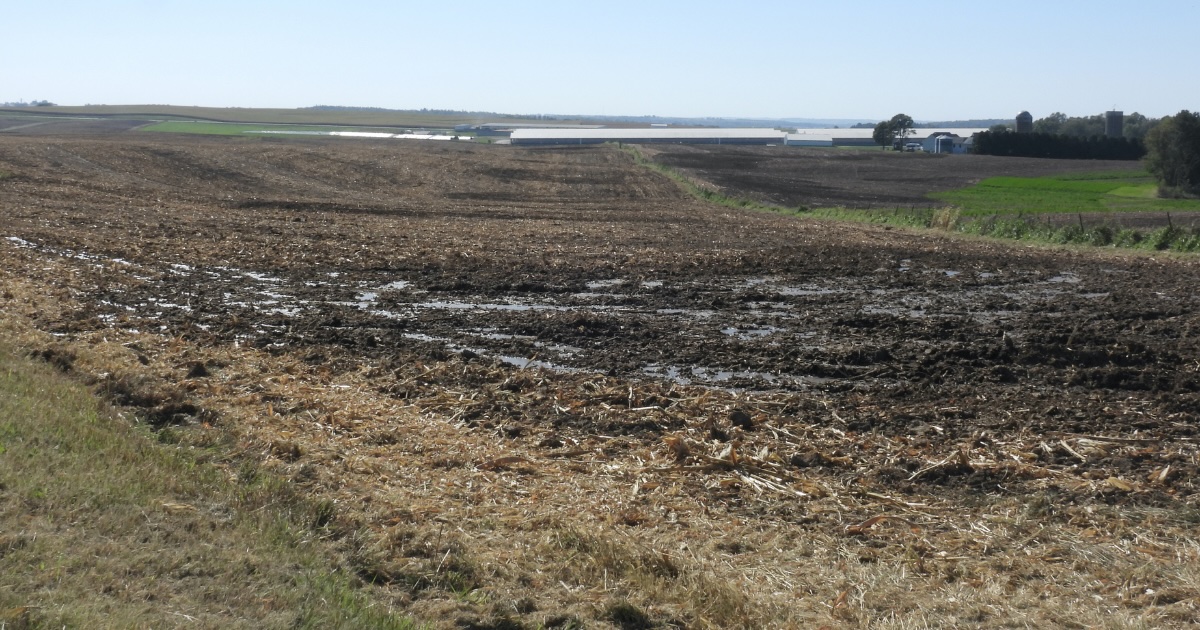ALBANY, N.Y.—Climate activists were in the holiday spirit Tuesday as they occupied a festive, mural-clad reception room near Gov. Kathy Hochul’s office. To cheers of “climate change is coming to town,” protestors urged Hochul to close the year by signing what could be the nation’s second climate adaptation bill.
The Climate Change Superfund Act, New York’s answer to the skyrocketing costs of dealing with damages from climate change, was the focus of about 85 climate change organizers, who pressed Hochul to sign the bill as quickly as possible—and with no major changes. The group, which was sponsored by 43 environmental organizations, was prepared to continue sitting in until Thursday.
At approximately 7:30 p.m., about a dozen organizers were arrested for “criminal trespass” for conducting the demonstration past 7, according to the organizers.
Lawmakers say that the superfund would give New York a badly needed new source of revenue to help it adapt to statewide, irreversible environmental damage. The bill borrows from the federal “polluter pays” principle, which allows the U.S. Environmental Protection Agency to hold companies accountable for releasing pollution into the environment. But it strays from that slightly by applying the concept to manufacturers of fossil fuels, not all air pollution emitters.
Under the superfund act, the world’s largest fossil fuel companies would be required to pay the Empire State billions for the damages caused by their products, raising $75 billion over 25 years. Fees would be allocated according to a company’s share of emissions from 2000 to 2018. By the turn of the millennium, climate science was so well established that “no reasonable corporate actor could have failed to anticipate regulatory action to address its impacts,” lawmakers wrote in the bill.
At least 40 percent of the money contributed, $26.25 billion, would go toward climate adaptation projects in disadvantaged communities. The law will not target future fossil fuel production and therefore will not directly affect future emissions.
Business groups in New York have urged Hochul not to sign the bill, calling it an unfair approach to addressing problems that affect everybody and arguing that it will raise prices for consumers.
Economists have pushed back on the latter argument, saying that because the law covers past sales, fossil fuel companies cannot pass along the costs to consumers at the pump.
The superfund would shift some of the burden of climate adaptation away from taxpayers, who the state projects will be on the hook for hundreds of billions of dollars to address climate damages in the coming decades, and onto the ledgers of fossil fuel companies, whose products have contributed excess greenhouse gases to the atmosphere while raking in immense profits for their shareholders.

Last year, three of the world’s largest oil and gas companies—Exxon, Chevron and Shell—reported combined profits of over $85.6 billion. It is unlikely that yearly payouts for any of those companies would eclipse 5 percent of their 2023 earnings.
Earlier this month, Politico reported that Hochul sent Democratic lawmakers suggested changes to the superfund act, indicating that she may be leaning toward signing it. Her proposals included extending the covered period to 2024 and giving the executive branch more control over when funds are spent, among several others.
Many of the activists in Albany said the bill’s basic premises—$75 billion over 25 years in even increments, with at least 35 percent of that money going toward disadvantaged communities—must remain untouched in negotiations.
“We’re really confident with the legislation as it has been written,” said Keanu Arpels-Josiah, an organizer with Fridays For Future NYC, a regional branch of the international, student-driven climate activist organization.
“We’re really concerned hearing about these kinds of negotiations going on” if they could lead to a weakened bill, he added. “We’re hopeful that the legislation will be signed, but we’re only celebrating that if it is the strong legislation that is written.”
Arpels-Josiah, a first-year student at Swarthmore College, wore a surgical mask, blue pants and grey fleece to give him some warmth on the dreary, wet day. In New York City, where Arpels-Josiah is from, “I feel like every time it rains now there’s flooding,” he said. Stormwater and sewage infrastructure upgrades are vital for the city’s future, and cooling centers in the city—spaces in air-conditioned buildings open to the public during the summer—could also use funding from this bill, he said.
At a press conference in the Capitol on an opulent set of stone stairs known as the “million-dollar staircase,” spokespersons from seven organizations said that Hochul’s political legacy, and the health of future generations of New Yorkers, were both reasons she should sign the bill as quickly as possible.
“The environment I grew up in is not the environment children today grow up in,” said Blair Horner, executive director of the New York Public Interest Group, a nonpartisan research and education nonprofit. “Fossil fuel companies are making our lives worse and making our taxes go up. Governor Hochul can do something about both with the stroke of a pen.”
“You will be judged by decisions you make in the next couple days, none more so than whether or not you sign this bill,” said Fred Kowal, president of the United University Professions, a labor union. “We will vote in 2026 based on how Kathy Hochul behaves.”
Other speakers offered a more somber message. “We are all unavoidably involved in a fossil fuel economy,” said the Rev. John Paarlberg, a member of the social justice commission of the New York State Council of Churches. “But some are much more responsible and culpable than others.”
Oil companies, he said, have known about the effects of their product on the Earth’s atmosphere for decades and have relentlessly tried to suppress that knowledge.
“Major oil companies have reaped enormous profits from selling fossil fuels,” he said. “Jesus said to whom much has been given, much will be required. It is fair and just that those who have reaped such enormous profits from selling products that they knew were harming the environment should shoulder the responsibility and the costs of repairing the damage and helping us become more resilient.”
Justin Flagg, director of communications and environmental policy for state Sen. Liz Krueger, a Manhattan Democrat and the bill’s sponsor, said Krueger remains optimistic as Hochul and lawmakers engage in negotiations over amendments.
Business groups opposed to the bill do not see any merit in the amendment process. “The bill should be vetoed,” said Ken Pokalsky, vice president of the Business Council of New York State, in an email. “We are not pushing for any amendments because we believe this is fundamentally flawed policy, legally suspect, with major implementation issues.”
In May, Vermont became the first state to pass climate superfund legislation. California, Maryland, Massachustts and New Jersey are all developing similar bills.
Hochul has until the end of the year to sign or veto the bill. “Today was a real show of power,” Arpels-Josiah said on a bus back to New York City from Albany. “This legislation could mean a world of difference for many, many lives throughout the state.”
About This Story
Perhaps you noticed: This story, like all the news we publish, is free to read. That’s because Inside Climate News is a 501c3 nonprofit organization. We do not charge a subscription fee, lock our news behind a paywall, or clutter our website with ads. We make our news on climate and the environment freely available to you and anyone who wants it.
That’s not all. We also share our news for free with scores of other media organizations around the country. Many of them can’t afford to do environmental journalism of their own. We’ve built bureaus from coast to coast to report local stories, collaborate with local newsrooms and co-publish articles so that this vital work is shared as widely as possible.
Two of us launched ICN in 2007. Six years later we earned a Pulitzer Prize for National Reporting, and now we run the oldest and largest dedicated climate newsroom in the nation. We tell the story in all its complexity. We hold polluters accountable. We expose environmental injustice. We debunk misinformation. We scrutinize solutions and inspire action.
Donations from readers like you fund every aspect of what we do. If you don’t already, will you support our ongoing work, our reporting on the biggest crisis facing our planet, and help us reach even more readers in more places?
Please take a moment to make a tax-deductible donation. Every one of them makes a difference.
Thank you,

















